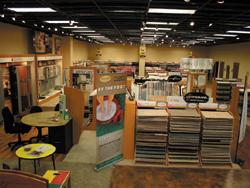Best Practices - January 2009
By Sonya Jennings
In 1967, McCool’s Flooring began as a side job for Virgil McCool, an employee of Chrysler transmission at a large plant in Kokomo, Indiana. His captive audience of 10,000 fellow employees would see his carpet samples go by on the hooks that also held transmissions. He was known as “the carpet guy” and ran the business from his home. His wife, Carole, would handle the paperwork when orders came in and sell carpet as well when she had the opportunity.
With 10,000 plant employees all excited about the latest McCool’s T-shirt (who doesn’t love a free T-shirt?), Virgil McCool created a steady stream of customers. He stayed on with Chrysler until retirement.
Virgil’s son, Doug, joined the business after graduating from college in 1988. McCool’s Flooring now has three locations, one in Kokomo and two in Indianapolis, Indiana.
The store handles 90% residential replacement and 10% commercial replacement, and it targets the mid to high end of the market. McCool’s offers carpet, hardwood, laminate, tile, and more. The store mainly advertises through broadcast television. According to Doug McCool, “We used to put our advertising dollars in many different areas, but now 90% goes to television. My employees can tell when we are on television and when we are not because it really affects store traffic.” The other 10% of the advertising budget goes to radio and some occasional print.
When asked what has made his company successful, Doug McCool says, “Once I saw Ken Blanchard give a talk at a Mohawk Floorscapes convention, and he talked about being the CSO, ‘Chief Spiritual Officer.’ That perfectly describes my father and what our company was built upon.” The McCools see themselves as a family running a family. Doug’s father has always said, “What good is this business if we can’t touch people’s lives in a positive way?” Doug McCool basically describes his company as a warm, happy place that people just want to be a part of. There’s always a kind word of encouragement or motivation, and employees feel valued and appreciated.
McCool’s measures and inspects every piece of carpet when it is delivered to the store. Doug McCool says, “This is a very simple practice we began years ago that has saved us too much time and trouble to count.” The day any carpet product arrives, his team measures and inspects it so that when a customer is given an installation date, there will be no reason to cancel at the last minute. He adds, “How embarrassing for a business to bring a carpet to install and then have to say ‘oh wait, this is the wrong size.’ There is no excuse for not solving that problem before installation day.” These are the types of things that make a good business a great business. And the customer may not even know why, but she feels strongly about the quality of the store because things have progressed smoothly. The idea to make the “measure and inspect every carpet” rule was born out of a philosophy of trying to see the business from the customer’s perspective. Doug McCool says, “We are always trying to view what we do from our customer’s perspective. What would make me want to do business with my store?”
McCool’s Flooring makes a serious effort to stay in touch with what its customers want. Doug McCool says, “Oftentimes, flooring store owners make the mistake of listening to their manufacturer sales reps rather than their salespeople.” The sales staff at McCool’s is highly trained to listen to the wants and needs of customers, and that information is passed along to managers who make sure the store selection reflects the desires of the local community. Doug McCool adds, “If there is something a customer wants, and we don’t have it, my thought is…get it.” At this time, customers are mainly focused on green, value, and affordability.
In Kokomo, where the main store is located, there have been many lay-offs due to the downturn in the economy. With more time on their hands, locals are looking for home-improvement projects. McCool’s has recently sold a lot of flooring to customers who are installing it themselves. The store sells the product and then serves as an installation consultant. In this situation, customers tend to upgrade on product (such as hardwood instead of laminate) because they are saving on labor cost. This is an example of how McCool’s has adapted to changes in the local economy.
Resources that have been extremely helpful to McCool’s are the benchmarking tools provided by the World Floor Covering Association and Mohawk Industries. According to Doug McCool, “Sometimes as a retailer, you feel as if you are out on an island. When you need advice or something to compare your operation to, you can’t just go ask your local competition. The new benchmarking tools have been very valuable to me.”
Basically, Doug McCool inputs any store statistics that he is concerned about to compare them to other stores of comparable size around the country. He can compare numbers like profit margin, product mix, commissions, overall sales, and much more to similar operations. Doug McCool adds, “Now if I am wondering ‘Is this normal?’, I can answer that question online with these benchmarking tools.” All of the information put into these benchmarking tools is completely anonymous.
Looking at the business from the customer’s perspective and adapting to special circumstances have helped the McCool family build a business that people in Indiana trust.
Copyright 2009 Floor Focus
Related Topics:Mohawk Industries
